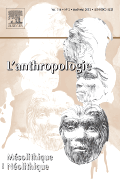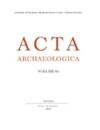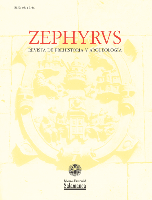
ANTHROPOLOGIE
Scope & Guideline
Bridging Cultures through Scholarly Inquiry
Introduction
Aims and Scopes
- Human Evolution and Prehistory:
A core focus of the journal is on understanding the evolution of humans, including the study of hominin fossils, early human behavior, and technological advancements throughout prehistoric times. - Archaeological Methodologies:
The journal emphasizes the use of diverse archaeological methodologies, including lithic analysis, geoarchaeological research, and techno-functional studies, to reconstruct past human activities and environments. - Cultural Practices and Symbolism:
Research related to cultural practices, including burial rites, ritualistic behaviors, and the significance of art and symbolism in prehistoric societies, is a consistent theme. - Regional and Temporal Diversity:
The journal addresses archaeological findings from various geographical regions and time periods, providing a comprehensive understanding of human societies across different contexts. - Interdisciplinary Approaches:
'ANTHROPOLOGIE' promotes interdisciplinary research that integrates anthropology, archaeology, geology, and other related fields to enhance the understanding of human history.
Trending and Emerging
- Integrative Evolutionary Perspectives:
There is a rising trend towards studies that examine human evolution through integrative frameworks, combining genetic, archaeological, and anthropological data to provide a more comprehensive understanding of human ancestry. - Advanced Technological Applications:
The use of advanced technologies such as 3D scanning, isotopic analysis, and remote sensing in archaeological research is increasingly prevalent, allowing for more detailed and nuanced studies of ancient human behaviors and environments. - Rituals and Mortuary Practices:
An emerging theme focuses on the analysis of ritualistic and mortuary practices across different cultures and epochs, emphasizing their significance in understanding social structures and cultural identities. - Paleoenvironments and Climate Change:
Research that connects human activities with paleoenvironmental changes and climate dynamics is gaining traction, highlighting the interactions between humans and their environments over time. - Cultural Diversity and Symbolic Expression:
There is a growing emphasis on exploring the diversity of cultural expressions, including art, symbolic behaviors, and the implications these have for understanding prehistoric social dynamics.
Declining or Waning
- Traditional Lithic Analysis:
There has been a noticeable decline in papers focused solely on traditional lithic analysis without integrating new technologies or interdisciplinary approaches. - Emphasis on Isolated Case Studies:
Research that presents isolated case studies without broader contextualization or comparative analysis is becoming less frequent, as there is a shift towards more integrative and comprehensive studies. - Focus on Historical Archaeology:
The journal has seen a decrease in publications related to historical archaeology, particularly those that do not connect to broader prehistoric narratives or anthropological implications. - Limited Regional Studies:
There appears to be a waning interest in narrow regional studies that do not contribute to larger global or comparative understandings of prehistoric human behavior. - Underrepresentation of Contemporary Anthropological Issues:
The journal has increasingly shifted focus away from contemporary anthropological discussions related to modern human behavior and societal issues, which were more prevalent in earlier publications.
Similar Journals

ACTA ARCHAEOLOGICA
Innovative Insights into Human HistoryACTA ARCHAEOLOGICA is a highly regarded, peer-reviewed journal published by BRILL, focusing on the dynamic field of archaeology. With an ISSN of 0065-101X and an E-ISSN of 1600-0390, this journal disseminates innovative research, critical analyses, and comprehensive reviews that contribute to our understanding of human history, cultural heritage, and archaeological methodology. ACTA ARCHAEOLOGICA has excelled in its field, achieving a Q1 ranking in both the Arts and Humanities and Social Sciences categories for 2023, showcasing its impact and relevance in scholarly discourse. Though not currently open access, the journal caters to a diverse audience of researchers, professionals, and students, offering invaluable insights into archaeological studies from a global perspective. As it continues to foster academic dialogue, ACTA ARCHAEOLOGICA remains a cornerstone for those looking to deepen their knowledge and engage with cutting-edge archaeological research.

Archaeological and Anthropological Sciences
Advancing Knowledge at the Intersection of Time and CultureArchaeological and Anthropological Sciences is an esteemed peer-reviewed journal published by Springer Heidelberg, specializing in the interdisciplinary fields of archaeology and anthropology. Since its inception in 2009, this journal has established itself as a pivotal resource for researchers and professionals, featuring cutting-edge studies that bridge the gap between the sciences and humanities. With its impressive 2023 Q1 rankings in Anthropology and Archaeology categories, the journal stands out in the Scopus landscape, ranking within the top 5% of its field—Rank #18/413 in Archaeology (Arts and Humanities) and Rank #28/502 in Anthropology. This is complemented by its commitment to disseminating high-quality research to a global audience, despite being a non-Open Access publication. The journal's scope encompasses innovative methodologies, archaeological findings, and anthropological insights that are vital for advancing knowledge and fostering academic discourse. As it moves toward its upcoming converged years, Archaeological and Anthropological Sciences continues to solidify its reputation as a key forum for scholarly exchange in these fields.

SOUTH AFRICAN ARCHAEOLOGICAL BULLETIN
Advancing Archaeological Insights and Discoveries.Welcome to the SOUTH AFRICAN ARCHAEOLOGICAL BULLETIN, a premier academic journal dedicated to the dynamic field of archaeology in South Africa and beyond. Published by the SOUTH AFRICAN ARCHAEOLOGICAL SOC, this journal boasts an impressive Q1 ranking in both Archaeology (arts and humanities) and Archaeology categories as of 2023, placing it among the top tier of scientific journals in its discipline. With an extensive publication history spanning from 2002 to 2023, it serves as a crucial platform for disseminating pioneering research and scholarly discussions that illuminate the rich tapestry of South African archaeological heritage. Although it does not currently offer open access, the journal’s rigorous peer-review process, combined with its standing in the Scopus rankings—where it ranks 78 out of 413 in the arts and humanities and 75 out of 354 in social sciences—underscores its commitment to academic excellence. Researchers, professionals, and students alike will find this journal an essential resource for exploring innovative methodologies, archaeological discoveries, and theoretical advancements shaping the understanding of human history.

Anthropologie-International Journal of Human Diversity and Evolution
Unraveling the Threads of Human EvolutionAnthropologie-International Journal of Human Diversity and Evolution is a prominent peer-reviewed journal published by the esteemed MORAVIAN MUSEUM in the heart of the Czech Republic. With a focus on anthropology, this journal serves as a vital platform for the dissemination of innovative research that explores human diversity and evolutionary studies. The journal operates under a rigorous academic framework and is categorized in the Q3 quartile for anthropology in 2023, reflecting its significance in the field. Although it does not currently offer open access options, Anthropologie facilitates the exchange of knowledge through its carefully curated articles spanning diverse topics within human evolution. Its Scopus ranking (320 out of 502 in social sciences) underscores its role as a relevant source for scholars and professionals alike, fostering dialogue and advancements in understanding human diversity. Researchers, students, and practitioners can look forward to engaging content that not only enlightens but also inspires further inquiry into anthropological studies.

INTERNATIONAL JOURNAL OF OSTEOARCHAEOLOGY
Exploring Human History Through BonesWelcome to the INTERNATIONAL JOURNAL OF OSTEOARCHAEOLOGY, an esteemed publication in the fields of anthropology and archaeological science, published by Wiley. Established in 1991, this journal has consistently provided a platform for groundbreaking research, with its scope encompassing the study of human remains in archaeological contexts. Boasting an impressive impact factor and ranking in the top quartile (Q1) for Anthropology and Archaeology, the journal stands at the forefront of academic discourse, particularly in the arts and humanities. With Scopus rankings placing it within the 88th percentile in Archeology and the 81st percentile in Anthropology, it serves as a vital resource for researchers, professionals, and students alike. Though currently not offering Open Access, the journal remains committed to disseminating high-quality research that contributes significantly to our understanding of past societies through the careful study of osteological remains. Explore our extensive archives and join a community of scholars dedicated to advancing knowledge in osteoarchaeology.

Rossiiskaya Arkheologiya
Exploring the Depths of Human HistoryRossiiskaya Arkheologiya, published by IZDATELSTVO NAUKA, stands as a leading academic journal in the field of archaeology and history, renowned for its commitment to advancing scholarly discourse and research in these vital humanities disciplines. With an impressive Impact Factor and a distinguished position as a Q1 journal in both archaeology and history for 2023, it ranks among the top tier of academic publications, reinforcing its reputation within the scientific community. The journal features a diverse array of studies focusing on archaeological methodologies, historical analyses, and cultural heritage, fostering collaboration and knowledge exchange among researchers, professionals, and students alike. While access to its rich repository of insights is through a traditional subscription model, the journal’s contribution to the archaeological narrative not only elevates current research practices but also propels future inquiries within the Russian Federation and beyond. Addressing critical questions and dialogues within its scope from 2017 to 2023, Rossiiskaya Arkheologiya serves as an essential resource for anyone dedicated to exploring the complexities of human history through material culture.

Zephyrus-Revista de Prehistoria y Arqueologia
Bridging Past and Present Through Archaeological InsightZephyrus-Revista de Prehistoria y Arqueologia, published by UNIV SALAMANCA, EDICIONES, is a renowned academic journal dedicated to the fields of archaeology and prehistory. Since its inception in 1950, the journal has embraced an Open Access model, facilitating widespread access to cutting-edge research and scholarly discourse while fostering global collaboration among researchers. Based in Salamanca, Spain, this journal has achieved remarkable recognition, evidenced by its Q1 rankings in Archaeology and History as of 2023, and impressive Scopus standings across various categories, including an 83rd percentile in History. The journal's comprehensive scope since 2011 has made it a vital resource for academics seeking to deepen their understanding of human history through archaeological insights. Zephyrus not only provides a platform for disseminating innovative research findings but also serves as a bridge between historical scholarship and contemporary archaeological practices, ensuring that researchers, professionals, and students alike have access to the latest developments in the field.

Origini
Pioneering Discoveries in Archaeological Scholarship.Origini is a distinguished journal dedicated to the field of archaeology, published by EDIZIONI QUASAR S TOGNON SRL in Italy. With an ISSN of 0474-6805, it offers a platform for researchers and professionals to share their latest findings and insights. Having achieved a significant Q2 ranking in both Archaeology (Arts and Humanities) and Archaeology (Social Sciences) categories according to Scopus, it positions itself as a respected source of scholarly communication in the discipline. Over the converged years from 2017 to 2023, Origini has consistently aimed to advance archaeological research, fostering an environment where innovative theories and methodologies can be developed and discussed. Although it is not an Open Access journal, its contributions remain vital for academics and students seeking to deepen their understanding of archaeological practices and historical narratives. With a commitment to excellence, Origini stands as an essential resource within the archaeological community, inviting contributions that push the boundaries of knowledge and interpretation.

Journal of Paleolithic Archaeology
Unearthing the Secrets of Our AncestorsJournal of Paleolithic Archaeology, published by SpringerNature, stands at the forefront of scholarly research in the field of archaeology, focusing specifically on the rich and complex narratives of human prehistory. With an E-ISSN of 2520-8217, this engaging journal serves as a vital resource for researchers, professionals, and students alike, offering open-access articles that disseminate groundbreaking discoveries and theoretical advancements in Paleolithic studies. The journal's objective is to foster a deeper understanding of early human culture, technology, and the environment, ensuring accessibility to vital knowledge that shapes our understanding of human evolution. As the field of archaeology continues to evolve with innovative methodologies and interdisciplinary approaches, the Journal of Paleolithic Archaeology emerges as an essential platform for sharing insights and fostering a vibrant academic community dedicated to unraveling the mysteries of our ancient past.

Stratum Plus
Navigating the Rich Tapestry of Human ExperienceStratum Plus, published by HIGH ANTHROPOLOGICAL SCH UNIV, is a distinguished academic journal based in Moldova that focuses on the fields of Anthropology, Archeology, and History. With an impressive impact factor reflecting its stature—ranked in the Q2 category for both Anthropology and Archeology, and Q1 for Archeology in the arts and humanities—this journal is a vital resource for scholars, professionals, and students alike. The journal's comprehensive scope encompasses a wide array of interdisciplinary studies, making it a beacon for innovative research and critical discourse within these disciplines. Since its inception in 2014, Stratum Plus has strived to foster academic excellence and knowledge dissemination, thus playing a crucial role in shaping contemporary anthropological and archaeological thought. While currently not available as Open Access, the journal maintains a strong online presence, with access options available through institutional subscriptions. Located at ZIMBRULUI 10A ST, KISHINEV MD-2024, MOLDOVA, Stratum Plus invites contributors and readers to engage with cutting-edge research that continues to enrich the global academic community.